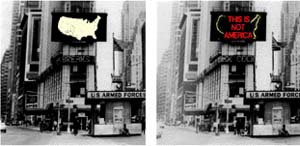 hace muchos años que he querido publicar esto en internet, y por fin hoy fue el dia, la razon? simplemente pq detesto que los 'gringos' se quieran adueñar de todo y que entre lineas den a entender al mundo que ellos son America, ya he estado en varias discusiones al respecto y los defensores de EUA, mencionaron que tienen derecho a llamarse asi ya que el nombre de su pais incluye la palabra America, pero aun asi no veo pq se tienen que adueñar del gentilicio. Tampoco creo que el termino "estadounidense" sea 100% correcto, ya que el nombre oficial de México, es "Estados Unidos Mexicanos", so... hay que buscarles un nombre correcto, y en pro de mi post, para los que no sepan y para que se enteren aquellos, aqui les dejo:
hace muchos años que he querido publicar esto en internet, y por fin hoy fue el dia, la razon? simplemente pq detesto que los 'gringos' se quieran adueñar de todo y que entre lineas den a entender al mundo que ellos son America, ya he estado en varias discusiones al respecto y los defensores de EUA, mencionaron que tienen derecho a llamarse asi ya que el nombre de su pais incluye la palabra America, pero aun asi no veo pq se tienen que adueñar del gentilicio. Tampoco creo que el termino "estadounidense" sea 100% correcto, ya que el nombre oficial de México, es "Estados Unidos Mexicanos", so... hay que buscarles un nombre correcto, y en pro de mi post, para los que no sepan y para que se enteren aquellos, aqui les dejo:
de es.wikipedia.org:
Etimología
A pesar de la atribución de su descubrimiento para Europa a Cristóbal Colón, su denominación se debe a otro explorador italiano: Américo Vespucio. Sus viajes al continente que él nombró como Nuevo mundo quedaron reflejados en múltiples cartas que años más tarde, alrededor de 1507, llegaron al cartógrafo alemán Martin Waldseemüller, que denominó el continente como América, haciendo homenaje al nombre de Vespucio.
Geografía física
Es la segunda masa de tierra más grande del planeta. La extensión aproximada es de 42 millones km².
wikipedia.org:
American in the Americas
The word America was derived by German cartographer Martin Waldseemüller from the Latinized version of the name of Amerigo Vespucci (Americus Vespucius), an Italian merchant and cartographer whose exploratory journeys in the late 1400s and early 1500s brought him to the eastern coastline of South America and to the Caribbean. The term American was subsequently used as an adjective describing the New World and its native people.
Proponents of a change to the usage suggest that the word American should reflect a lexical attachment to 'America' broadly defined as the continent/s of North and South America, and that the current usage is at best inaccurate, and at worst redolent of perceived US imperialism.
Proponents of the continued usage of American to refer to the United States argue that the USA is the only sovereign nation in the world with the word America in its official name. Additionally, other nations, including Mexico presently and Brazil in the past, have or have had the term "United States" in their official names. Thus, to many, referring to US citizens as Americans is convenient and legitimate, while using US could in fact be ambiguous.
Seeking alternate names
Some people would extend the use of the word "American" to indicate any inhabitant of the Americas (which Europeans tend to consider a single continent, called "America") rather than specifically a citizen of the United States; and perceive the latter usage of "American" to be potentially ambiguous, and perhaps aggressive in tone or imperialistic, a rather widespread view in Latin America.
Regardless, many question a nation's right to formally appropriate the name of a continent for itself, citing the fact that America existed long before the United States of America. Indeed, Amerigo Vespucci (who travelled extensively throughout the Caribbean basin) never set foot on present US territory.
In other cases, the motivation is not so much political as it is academic, to avoid a perceived ambiguity. For instance, in legal circles a citizen of the United States is usually referred to as a 'U.S. citizen', not an 'American citizen', which could arguably apply to citizens of other American nation states as well.
The alternatives
Attempts to create such a name have failed to gain widespread use. Proposals have included:
- Americanite
- Appalacian
- Colonican
- Columbard
- Columbian (drawn from the District of Columbia)
- Frede or Fredonian
- Nacirema
- Pindosian (or just Pindos)
- Statesider
- Uesican or Uessian
- Unisan or Unisian
- United States American, United Stater, United Stateser, United Statesian, United Statesman, or United Statian
- USAian, U.S. American, Usan, USAn, Usanian, Usian, U-S-ian, or Usonian
In other languages, such as Spanish, American is more ambiguous. In the Ibero-American countries, the use of "American" to refer only to U.S. citizens could be considered factually incorrect and culturally aggressive.
Several of these terms have direct parallels in languages other than English. Many languages have already created their own distinct word for a citizen of the United States:
- United Statesian directly parallels the Spanish term estadounidense.
- Norteamericano (North American) is common in Latin America, but suffers from the same kind of ambiguity as American, since Canadians and Mexicans, amongst others, are also North Americans.
- In Portuguese, norte-americano is the most commonly used term. Estadunidense is gaining some popularity, specifically in Brazil, where its usage traditionally rises during times of tension with the USA.
- In French, États-Unien(ne), Étatsunien(ne) or Étasunien(ne) are gaining some popularity.
- In Italian the term Statunitense (from Stati Uniti = United States) is quite widespread, especially referring to sporting events.
- In German, US-Amerikaner may be used to avoid ambiguity or to be politically correct, but it may come across as pedantic if used conversationally. Amerikaner is in general usage in Germany, and is widely accepted to refer to the United States. Ami is a colloquialism which unambiguously refers to US citizens. The German usage of Ami is akin to the Mexican usage of Gringo, in that it can be neutral, patronizing, or perhaps even affectionate.
como pueden ver, esos weyes no tienen nombre. Tambien llevo meses pensando en enviar mails a todos los medios que usen terminos incorrectos o por lo menos el termino "americano" o "norteamericano" refiriendose a ellos, pero no me he puesto a recolectar mails, pero pronto lo hare.
2 imagenes de Alfredo Jaar, en el texto en rojo dice 'This is not America':


Esta la hice yo:

